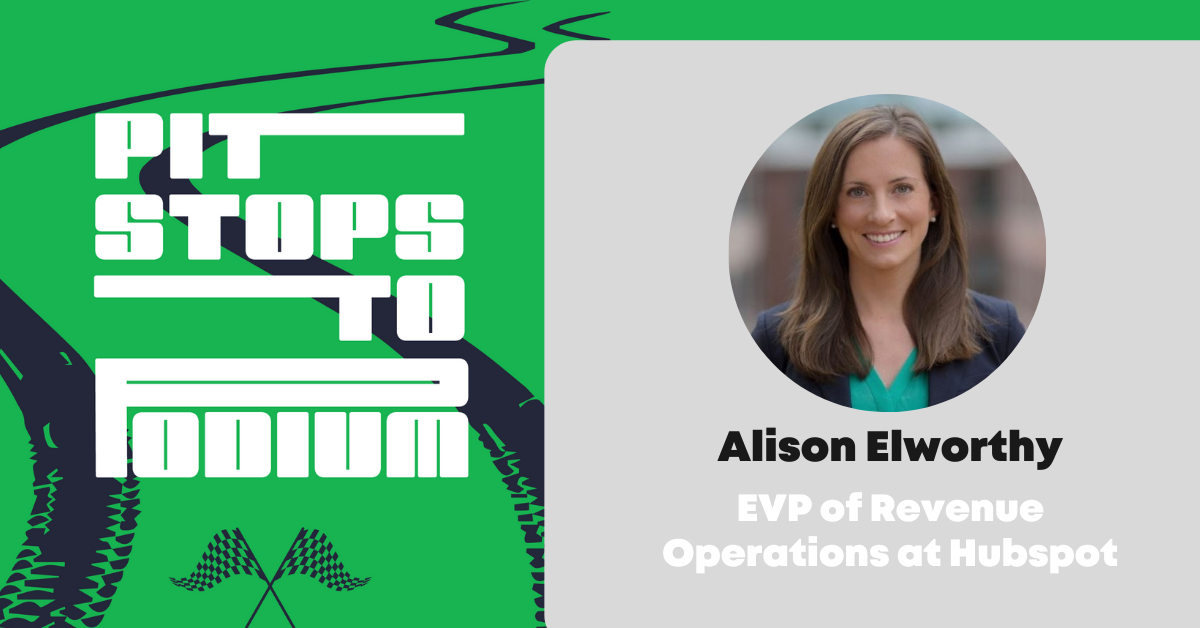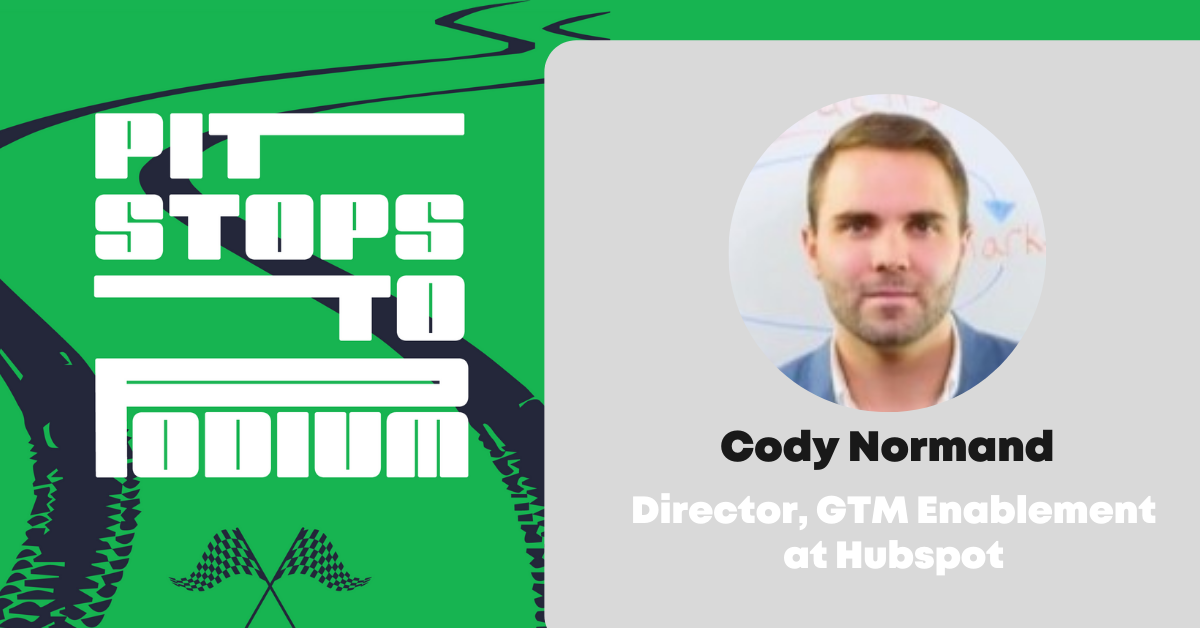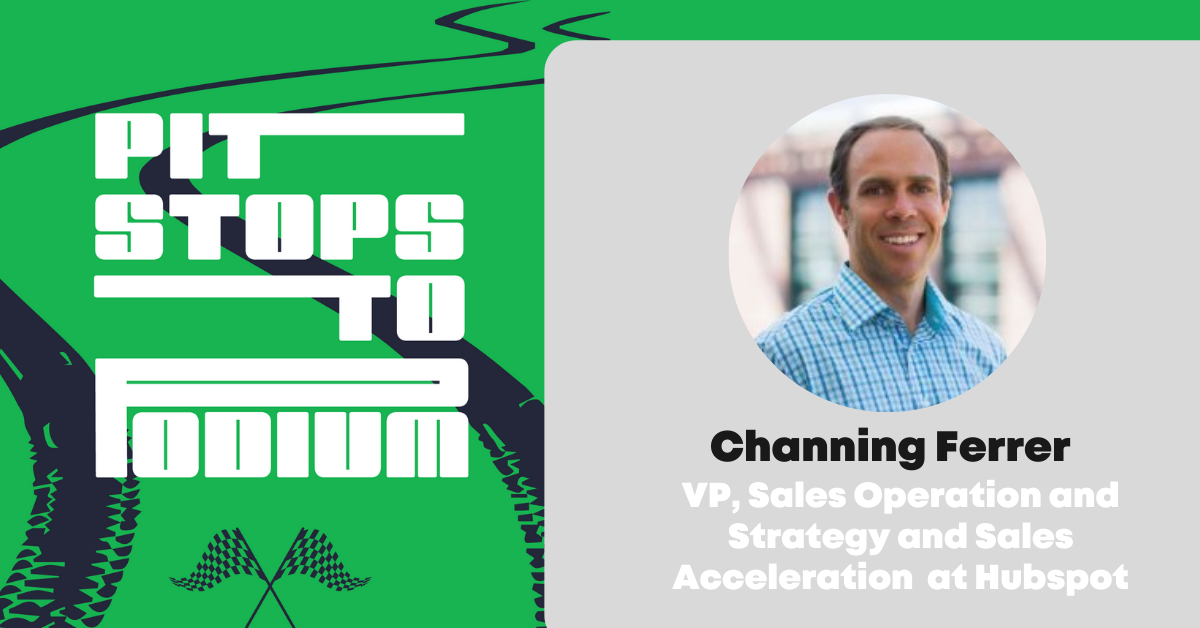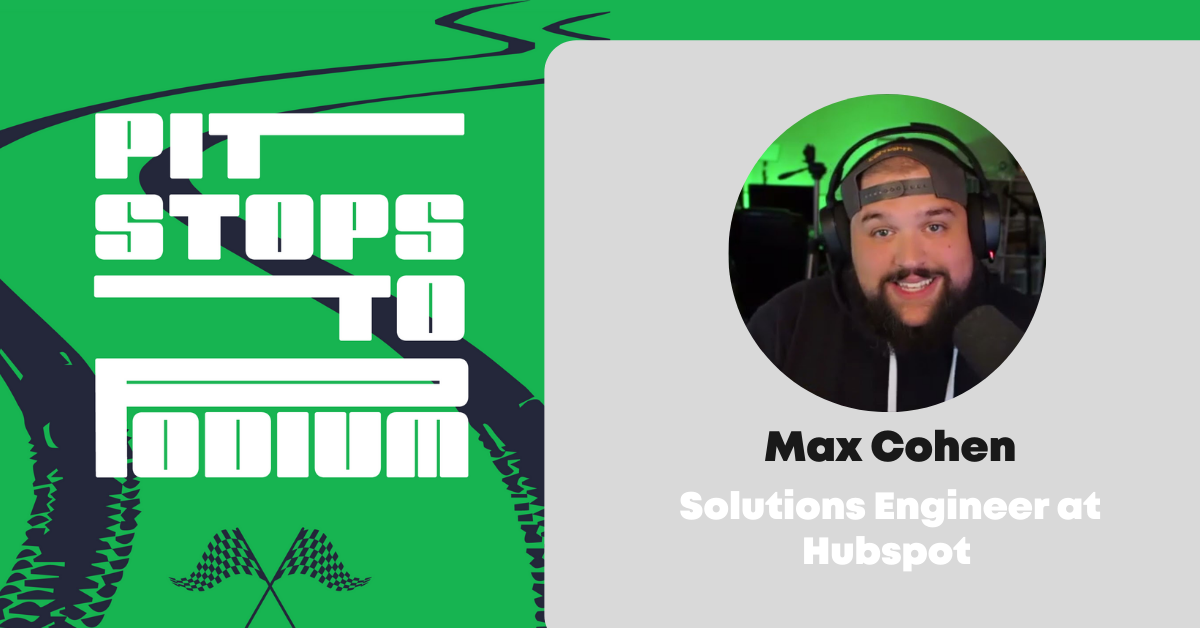Table of Contents
In Episode 29 of the B2B Podcast, Pit Stops to Podium, Alison Elworthy, EVP of Revenue Operations at Hubspot, shares the value of RevOps in helping companies scale through the customer experience, the speed to scale, and the way to break liner growth. Listen more for Alison’s take on scaling a company with the help of RevOps and its ability to break the traditional world of operations.
Alison Elworthy is the current EVP of Revenue Operations at Hubspot, where she leads a unified team of operations professionals, dedicated to designing strategies, systems, and processes that power Hubspot as it scales. Alison believes that operations teams hold the key to breaking linear growth and achieving sustainable scale –and she's passionate about helping companies realize that vision. In her free time, Alison enjoys spending time with her husband and three kids.
Pitstop Highlights
RevOps and Improving the Customer Experience
Oftentimes when a company begins to scale, the customer experience takes a back seat. This is primarily because the functional operations teams are set up in silos and end up approaching the customer experience from their own silo–often called the “function-out” strategy.
RevOps is able to build a company’s go-to-market strategy around the way customers really want to buy while also prioritizing the customer experience. RevOps teams are aligned in a way that enables a successful customer experience, understanding the overarching strategy and being able to align that strategy in the same process.
Using RevOps to Scale Companies with Speed
When you’re a small company, it’s easy to work closely with your peers to innovate and launch new ideas, fast. However, companies cannot afford to lose speed as they scale - in order to reach your goals, you have to stay big and fast. As a company scales, it can be challenging to stay big AND fast due to the complexity of growth like headcounts. The complexity begins to creep in–and can substantially slow down a business.
RevOps is able to create a single foundation that helps centralize teams and the core functional assets that teams are going to work off of. This will help drive business, innovation, or automation processes.
How RevOps supports Efficiency to Scale Companies
Many companies when scaling approach the efficiency challenge, or the way to break linear growth. The goal is to approach non-linear growth, where companies see a bigger return on their investments, more customers, more partners, and more revenue. You need to ask yourself questions like, "What are those processes?” “What are certain ways to enable my frontline reps?”
The most obvious way for a company to grow is to invest in headcount. But this linear way of ‘growing’ is expensive, unsustainable, and doesn’t work as you scale. RevOps solves this - With RevOps, you can innovate to build systems and processes that break linear growth, and double down on investments like sales acceleration and enablement, for example.
Connect With Alison:
- Connect on Linkedin: https://www.linkedin.com/in/alisonelworthy/
- Check out the Hubspot blogs: https://blog.hubspot.com/
Full Transcript:
Brendan: Hey, everybody, welcome to Pit Stops to Podium, the RevPartners podcast, where we talk to execs who competed and won, taking their companies from high growth to high scale. My name is Brendan Tolleson. I am the co-founder and CEO of RevPartners, and I'm delighted to have with me today, Alison Elworthy for this episode of Pit Stops to Podium. Welcome, Alison.
Alison: Well, Thanks for having me, Brendan.
Brendan: Absolutely. And Alison, this is a little bittersweet. We're coming towards the end of our month of Hubspot, where we are highlighting different executives. And so it's fun and fitting, I think, to end this series talking to you because you currently serve as the Executive Vice President of Revenue Operations. So this is a treat for me. And thank you again for coming on board.
Alison: Well, Thanks for having me. And hopefully we could end on a high note.
Brendan: Sounds good. Well, Allison, maybe give the audience a little bit more of a background on you. What really RevOps mean for Hubspot? But just your experience there? I think that'd be helpful for our audience.
Alison: Sure, so I currently lead the HubSpot Rev Ops team. So it's a group of ops professionals that are dedicated to designing strategies and systems and processes and insights that really will help power HubSpot as we continue to grow and scale.
Brendan: Excellent and, Alison, we will get into Rev ops up a little bit further, just as a quick tease in terms of a big idea, but before we do that, we do have a tradition here at this podium and that's to get to know our guests outside of work. So what would be three fun facts about you that our audience should know about you?
Alison: All right. Well, the first is that I just had my 10-year anniversary at Hubspot, so I'm going to HubSpot. For 10 years, I've held a bunch of different roles and operations, so I ran sales up. So marketing ops, general ops, I also like customer success. It's been one amazing journey, but I never thought I would be here for 10 years, so that's an exciting, fun fact.
Brendan: Have you had a sabbatical yet or is that implemented at a point in which you have not been able to experience it?
Alison: So I took my five-year sabbatical. I have not taken my 10-year sabbatical. Hopefully, I can plan that for next summer. I'm hoping my husband also works at a tech company that copied HubSpot with our sabbaticals, and his five year is coming up, so they kind of coincide, which will be unique and exciting. So hopefully within the coming year, we'll get that done.
Brendan: That's great. All right. So what else? OK so I have three kids. I have a almost seven-year-old son, four-year-old daughter and one-year-old daughter. We are very similar. I have three kids seven, 5 and three, so not. I know what you're experiencing right now. It's interesting. There's a chance that one will walk through that door. So now you're fully warned. And then my door is currently locked. Yeah so this is one that I forgot about and I never shared. I don't know. It's a fun fact, but I was the prom queen in high school.
Brendan: Congratulations.
Alison: I mean, I wish I still had that crown. I kind of blocked high school net all out of my memory, but that is one that's great.
Brendan: Well, thank you for sharing a little bit about your, your family and your past, and let's transition into some you're probably more interested in talking about besides prom, which is revenue operations and how that can help a company scale. And you know, rev ops or revenue operations has become somewhat of an emerging topic and a bit of a buzzword. So I think before we kind of get into how it can help companies scale, I think it'd be helpful to just define maybe what that looks like for you at HubSpot in terms of how you think about revenue operations.
Alison: Yeah so, you know, it helps that our mission is to help millions of organizations grow better. And to do that, we need to think differently in terms of how we think about growth, especially as we're scaling. So we need to think about new processes, new innovations, new ideas that are going to help us grow and scale. And so that all really comes down to rep ops. So we're trying to change the world of operations, essentially. You know, typically operations teams operate in their silos, right? And with rim ops, what we're doing is we're moving those silos and working together as one team. And what happens when you work together as one team is a lot of great stuff happens. You can better solve for your customer, right? You can work more efficiently and effectively. Instead of trying to coordinate between different teams. You can work as one team or work off one system or one set of data, for example, that makes you work faster and smarter. So those are some of the wins from a, you know, both a customer and company perspective as you think about forming rep ops and why we're forming RevOps at HubSpot. I love that, I think.
Brendan: Let's talk specifically, so that kind of defines how you think about revenue operations in the four walls of Hubspot, but there's also when you think about how companies scale and ultimately how robots can be a supporting function to ensure that that actually happens. There are three topics that I wanted to get your feedback on. We think about scale, and that's customer experience, speed and efficiency and ultimately how red ops plays into those three narratives. So let's start with customer experience from where you sit from a HubSpot perspective.
Alison: Yeah well, this is one that I'm super passionate about because prior to taking on this red ops role earlier this year, I led our customer success organization, so the customer experience is near and dear to my heart. And I think as a lot of companies grow, sometimes the customer experience can take a backseat. You know, you start figuring out how to optimize or work within your function, and you're solving for growth and revenue, and it's easy to forget about that customer. And if you are organized within kind of your functional teams, not only just customer experience, get lost, but the handoff of the customer between marketing to sales tasks is also lost. No one's looking at those handoff points. And I think even at Hubspot, we took a step back and we're listening to a lot of our customer feedback, and that's where a lot of the friction was coming up in the customer experience. It was those handoffs and the way in which we're organized internally reflected on that external customer experience. And I think, you know, talking about RevOps or AIOps can help overcome that challenge because RevOps can be that glue that end to end glue that holds your go to market teams together to really drive alignment across marketing, sales and CSS and identify where you may have gaps in the hand and between those teams.
Brendan: Yeah, it reminds me of when we did the Yamini podcast and she was talking about alignment. And when you're talking about these different department heads, if the customer is not the first thing you're talking about, then there's a problem. And I think that's one of the beauties. When you think about revenue operations, how you described it as glue, that it sits above and it looks at the whole customer journey. So it's that unifying voice to help every side see, while they may be in a silo, it's how do you actually break down those walls to reduce the friction that you just described? Well, we talked about a little about the customer experience. Now let's talk about how DevOps can support the speed aspect of a scaling organization. Yeah so this one, I'm super passionate about it as well.
Alison: So I started HubSpot. As I mentioned 10 years ago when I joined, we were scrappy startup. We were all crammed into shared office space. And I was in marketing and I worked. I sat next to someone in sales and someone next to customer success. And so when you're small, it's easy to be fast, right? You can kind of turn to your counterpart. And if you come up with a challenge, you can quickly chat with some to your left or right and come up with a solution. As a company grows and scales, it becomes a challenge. So what ends up happening is it gets really hard to say fast. So we say we want to be big and fast, not big and slow at HubSpot as we continue to grow. And so as a company grows, headcount grows, everything grows, complexity creeps in. And so there's more of the work to connect the dots across the different teams than the different people across the different systems, the data, the processes and that stuff just starts to slow you down. And what ends up happening is instead of people actually doing the work, they're coordinating the work. And I'd much rather have people doing the work and having an impact. So we can move quickly as opposed to coordinating the work. So speed is really what's top of mind when I think about one of those challenges that relapse can really solve
Brendan: Yes, I think that you talked about friction tax concept, and there's that tension of the startup, you have the energy you're able to move very fast, but inevitably your deployment when you're growing. There is complexity. Are there like a specific example for you just in terms of something you may have implemented to ensure that speed within hubspot?
Alison: Yeah so one of the things, when we pulled together all of our ops and strategy teams, everyone was working off a different system or a different data set. And so it asked the same question get two different answers or three different answers. And so what ends up happening is the teams are all trying to double check their work and figure out why this one person getting one answer versus the other. But what you can do in ripoffs is create kind of a single foundation, a single foundation. Maybe you're all working off of one system, or maybe you're all working on for one data set, right? Once you centralize those teams, you can also centralize those core foundational assets that your teams are going to work off to drive insights on your business, drive innovation for your business or drive automate more processes for your business.
Brendan: Yeah, I love that. We have a value internally, which I think speaks to that, but it's clarity creator, and it's the idea. What you're describing is give everyone a clear understanding of what the goals and objectives are, and they're measuring that. And so everyone has a common language that they can engage in. So also, we talked about customer experience, we just talked about speed. The last topic that I want to talk about is efficiency and how that helps, how RevOps up supports that scale aspect.
Alison: Yeah so efficiency is critical. I think about Hubspot's growth and it's been very linear, and I think a lot of companies grow linearly where you add more reps and more marketers and more folks and you know, your revenue continues to grow. But at some point that's going to like it's not sustainable. And so what we're looking to do, we talk about driving non-linear growth, and that's when you see a bigger return on your investments, you see more customers, more partners, more revenue right from the investments that you're putting in. And to do that, I think you need to be smart about it, right? You need to think about what are those processes, what are certain ways to enable your front line reps to actually get more out than what you put in? And when you have a RevOps team, you can obviously still look within your teams. What can we do in sales to drive more efficiency or marketing or css? But when we have a rent ops team, you can kind of take a step back and do trade offs. Actually, should we put more money into marketing versus sales, right? Because we're going to get a bigger return on our demand growth, whatever. That's a simple example, but I think efficiency is really important. And at some point you can't just keep dragging a spreadsheet. You have to be innovative about driving change and new processes and new insights to your business that are going to help you get more out of your investments.
Brendan: Yeah, to me, that's leverage in terms of what you're describing on an efficiency perspective. Is there? I mean, in your mind, is there a phase in which you would say, hey, there are a lot of inefficient processes, there's a standard answer for that. But have you seen your experience? Hey, this is when you need to embrace rev ops because it's slowing you down from an efficiency perspective.
Alison: Yeah, it's a great question. I get this question like, why should we embrace devops? And so I take a radical stance on this or it's rev up. You need rev ops. You know, on day one, you start a business as soon as you get a customer right, you have to understand like, OK, well, how long it take you to close that customer. You need those insights. You know, the insights on your customers or your prospects are critical. And rev ops kind of holds the keys to that right. They have the systems, the data, the insights that really understand what's going on in their business. So there's never a wrong time to start rev off, so you can never start too early. And I think what's great about rev offs is the sooner you do it, the less tech debt you're going to have later on. Because I think a lot of teams, especially now that rev up since the new thing, we're operating under silos. I'm stepping in, I'm like, Oh man, we have all this kind of tech debt to climb our way out of going to get alignment on our data and our systems. But if we'd started from a single kind of rev ops approach and had a single strategy, it would have been a lot cleaner. So there's never you're never too early to start, I would say.
Brendan: Well, I promise that wasn't a leading question for our audience, but I really appreciate your answer and love your answer a lot of what we do. But Alison, we talked about how RevOps can support scale. We talked about the experience, we talked the customer experience specifically, we talked about speed. We talked about efficiency. Any last thoughts as we conclude this session?
Alison: No, I think, you know, the other thing I'll just add is we didn't talk a lot about the people in rev ops. So the other reason why I love Rev Ops is for ops professionals. You know, typically ops folks are embedded in their functions, whether it's marketing, sales or stats, and they're always the last to be invested in. There's no real career path, and when you form rev ops, you bring those folks together and you invest in them from a development perspective, from a retention perspective, you create career paths. And so one of the greatest things since we formed red ops or the opportunities it's creating for the people that are on my team in terms of their development and career growth. So when you think about creating rev ops, also think about the people and how critical these people on your team are and how important it is to retain them. And I know it's super competitive to recruit out there today that there is a people element too, as in when you form rev ops, that I think is a huge win.
Brendan: I couldn't agree more. Alison, this has been a fantastic session. Really appreciate learning more about how HubSpot has embraced rev ops to help you scale. What are some practical ways in which our audience can engage both with you and with HubSpot going forward?
Alison: Yeah, definitely engage with us on our blog from the HubSpot perspective. We're all over all, all channels of social media. And then for me personally, it's probably LinkedIn. So, Alison Elworthy.
Brendan: OK, well, Alison, I really do appreciate the time you're clearly a subject matter expert in this category. So it's been a pleasure to have the opportunity to speak with you. And I know our audience will benefit greatly from your experience. So thank you again for dropping by.
Alison: Thanks for having me.
Want to learn more form industry experts?
Come check out the full Pit Stops to Podium podcast repository!




